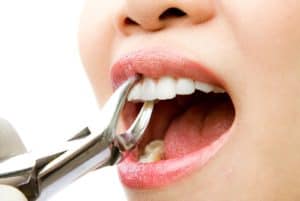Sometimes, due one reason or another we will need an extraction of one of our teeth. The reasons are many, such as poor oral health, some diseases, a bad hit to them, etc.
Whichever is the case, the dentist will make sure it is the last choice before resorting to extract a tooth. The other choices and treatments typically include the following: fillings, crowns, root canals, veneers, etc. Which if you are interested, we have very nice prices here in Los Algodones, Mexico.
What are some of the most common scenarios for a tooth extraction?
There are many, many reasons as to why a tooth should be subject to extraction. Here we will list some of the most common mouth issues for this to happen:
- The tooth is beyond repair, that is, it is heavily chipped or cracked.
- There is risk of infection of the tooth through the pulp.
- Extra teeth that are blocking others from naturally appearing.
- Milk teeth that are blocking the permanent ones from coming in.
- Some people with braces might need more space in their mouths in order to properly align their teeth.
- Cancer drugs that weaken the immune system, making it easier to develop an infected teeth.
- And then we have the wisdom teeth extraction. These are extracted as they can erupt sideways or in such a way that affects the person’s bite.
Do not attempt it by yourself
Tooth extraction requires training and experience, it is recommended to be done someone with four years or more of practice. This is important to talk about as there are things to take into account, after all, it is leaving a surgical wound that needs proper healing.
As such, people that suffer from diabetes, hypertention, or renal, thyroid, adrenal or other organ diseases must be treated with care. The surgery can be fatal for the patient if the proper measures are not taken.
And as always, as the mouth is filled with germs and bacteria, the patient is prone for postoperative infection. So please consider seeking a professional like our dentists in Los Algodones! Tooth extractions and removals, as well as the risks from it are not to be taken lightly.
How is the tooth extraction carried out?
First, as we have mentioned before, there are a number of diseases and scenarios to look for before proceeding. As such, your dentist will take a lot at your medical and dental history in order to take the proper measures. This includes X-rays.
As per usual, the area that will be treated is numbed with anesthesia. This helps a great deal in not feeling a thing, making it painless. Once that is taken care of, the tooth is loosened up with an elevator, a special tool. Dental forceps are then used to extract the tooth.
Depending on the situation, the underlying bone might be treated, and the area stitched that self-dissolves.
Once the extraction is done
- Once the extraction is done, you will be given a piece of gauze to bite on, this is to limit the bleeding.
- It is absolutely not advised to smoke or do any harsh movements with the mouth such as rinsing your mouth or cleaning the teeth close to the area.
- Remember to keep the area very clean. This is to prevent an infection.
- Usually you will feel some pain and discomfort after the extraction. For this the dentist will recommend or prescribe a pain killed to use.
- The discomfort typically lowers after three to two weeks, depending on the patient. Though feel free to contact your dentist if it persists.

